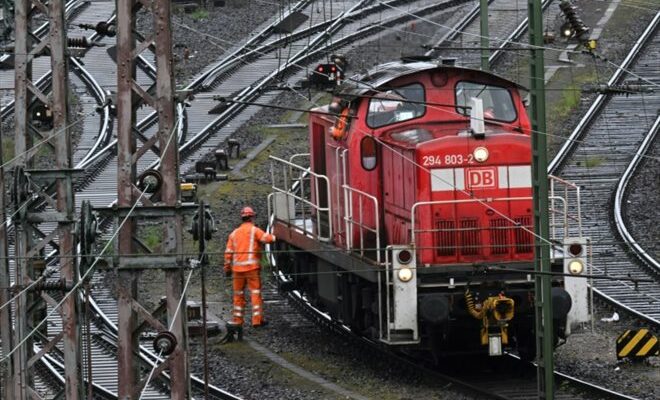German railway company Deutsche Bahn and the train drivers’ union announced an agreement on their salary negotiations (AFP/Archives/Kirill KUDRYAVTSEV)
German railway company Deutsche Bahn and the train drivers’ union announced on Monday an agreement on their wage negotiations after months of impasse and a wave of strikes which weighed on the country’s economic climate.
“The German locomotive drivers’ union (GDL) and Deutsche Bahn have reached a tariff agreement,” GDL said in a statement, adding that the content of the agreement will be detailed on Tuesday.
A spokesperson for Deutsche Bahn confirmed to AFP that an agreement to resolve the crisis had been reached, inviting the media to a press conference on Tuesday.
This agreement will put an end to one of the harshest and most costly social conflicts faced by German rail in recent years.
The GDL union has organized a series of six strikes since the end of 2023, some lasting several days in a row, causing massive disruptions to passenger and freight traffic. The last strike dates back to mid-March.
At the end of January, rail traffic was paralyzed for five days on the national network, one of the longest strikes in the history of Deutsche Bahn.
In addition to significant salary increases to compensate for inflation, the GDL union demanded a work week reduced to 35 hours, compared to the current 38, with no reduction in income.
One of Deutsche Bahn’s latest offers included a salary increase of up to 13%, as well as the possibility of reducing the working week to 37 hours from 2026.
– Government under pressure –
Europe’s largest economy has been facing an increase in social conflicts in different professional sectors for a year, from supermarkets to services, where negotiations on wages and working conditions are hardening after a long period of soaring prices.

The German railway company Deutsche Bahn and the train drivers’ union announced an agreement on their salary negotiations (AFP/Archives/Ina FASSBENDER)
These strikes are costly for Germany, already mired in a severe economic crisis, linked to the slowdown in the industrial sector, which led to a contraction in GDP of 0.3% last year.
Repeated strikes last year cost Deutsche Bahn some 200 million euros, according to estimates by the operator, which recorded a loss of more than 2 billion euros in 2023.
These social tensions are shaking up a country once renowned for the quality of its social dialogue and the search for consensus between employers and unions.
In addition to Deutsche Bahn, the airline Lufthansa is also grappling with wage demands from ground staff and cabin attendants. Several strikes have seriously disrupted the group’s activity in recent weeks and will weigh on the results of the first quarter with an operational loss which will be higher than expected, according to Lufthansa management.
Another social conflict concerns airport security personnel who have organized several walkouts since January.
To the point that certain political leaders have called for a tightening of the right to strike, already very regulated in Germany, a country where the number of days of work stoppages is one of the lowest in Europe.
Social Democratic Chancellor Olaf Scholz rejected calls for new rules to limit strikes.
These mobilizations also put pressure on his coalition with the environmentalists and the liberals, facing record unpopularity. Germany’s far-right AfD party is in ambush, hoping to take advantage of distrust in the government as several regional elections are planned this year.
© 2024 AFP
Did you like this article ? Share it with your friends using the buttons below.




